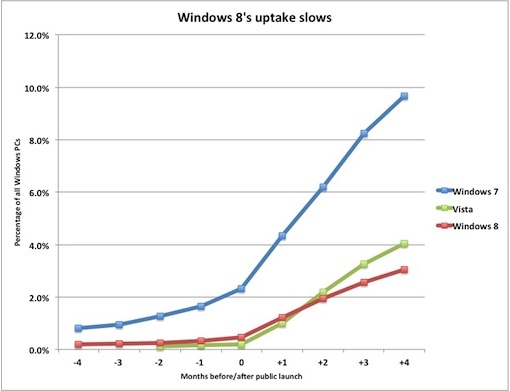Windows 8's uptake pace slowed in February for the third straight month, an analytics company said today.
According to Net Applications, Windows 8's February usage share -- including what the firm labeled as "touch" for Windows 8 and Windows RT -- was 3% of all Windows PCs, up from January's 2.6%.
Windows 8's share increase in February was about four-tenths of a percentage point, smaller than January's gain, which in turn was smaller than either December's or November's.
The new operating system also fell further behind the pace set by Windows Vista in 2007: In its fourth month of availability, Vista powered approximately 4% of all Windows PCs. The full percentage point gap between Windows 8 and Vista was the largest so far in the tracking Computerworld has conducted.
This new trend bolsters the belief by many analysts that Windows 8 will have a very difficult time gaining traction because of a pair of factors: First, that users are put off by the dual-UI (user interface) approach of the OS, and second, that PC sales have been clobbered by a shift to tablets and smartphones, the vast majority of which run rivals' operating systems.
Windows 8's initial uptake trajectory also makes it more likely that the new operating system will be labeled as an even bigger flop than Vista, which was largely rejected by users, who stuck with the older XP until Windows 7 arrived.
The latter's uptake was a rocket ride compared to Windows 8's or Vista's: By the end of its fourth month on the market, Windows 7 had garnered a 9.7% share, more than three times Windows 8's.
Even the inclusion of touch, and Windows 8's ability to run on tablets, has not materially helped the OS. Net Applications' measurement of users running Windows 8 from the "Metro" UI increased by just two-hundredths of a percentage point last month, while that for Windows RT remained flat.
Microsoft may be looking at similar data, as this week the Windows group's director of communications, Christopher Flores, confirmed that the company would partner with OEMs to launch a second wave of promotions for Windows 8 hardware.
Last weekend, U.S. retailer Best Buy kicked off a two-week deal that discounted touch-enabled Windows 8 PCs by $100.
Net Applications also reported statistics on other editions of Windows.
Both Windows XP and Windows 7 returned to their usual trends, with XP losing half a percentage point to end February at 39% of all personal computers, or 42.6% of Windows-only machines. Meanwhile, Windows 7 gained under one-tenth of a point to climb to 44.6% of all PCs and 48.6% of all Windows PCs.
Windows XP has just over a year left in its tank. Microsoft plans to pull the support plug in April 2014, even if, as Net Applications' data hints, the 11-year-old operating system then powers more than 30% of all personal computers.
Net Applications measures operating system usage by tracking unique visitors to some 40,000 websites it monitors for clients.

Windows 8 uptake pace slowed for the third straight month, falling even further behind Vista's and Windows 7's early adoption.





